Sons of bourgeoisie
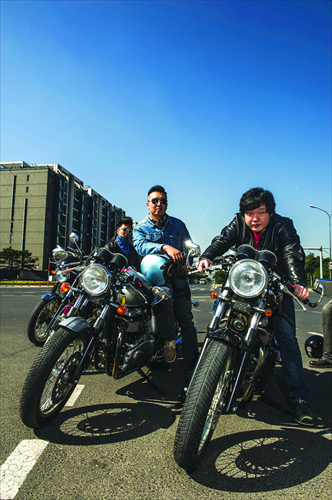
Retro Bikes Club members Yin Ziqi (left), Zhang Kun (middle) and Gao Xiaoyang (right) pose with their vintage Triumph motorcycles. Photo: Li Hao/GT
Narrow roads winding through Beijing's rural outskirts are often a tranquil sight, where lush green pastures and fresh mountain air offer a refreshing escape from downtown chaos. But most weekends this tranquility is hijacked by the thundering engines of motorcycles ridden by young urbanites eager to indulge in their high-octane hobby.
They strike a menacing presence with their leathers and shiny aviator sunglasses peering above bandanna masks. Negotiating tight turns at breakneck speeds, sparks occasionally flare as metal knee guards graze the road.
But motorcycle clubs in Beijing don't have the intense rivalries associated with their American counterparts. Passing each other on lonely roads, riders don't hesitate to shoot a thumbs up or offer a friendly honk to passing bikers.
Despite their camaraderie on the road, off the road Beijing's bikies keep largely to themselves.
"We don't hang out with other clubs. To be honest, I like stuff that others don't like," said Yin Ziqi, 28, one of the founding members of the Retro Bikes Club. "Some other clubs do business on the side by selling or modifying bikes, but not us. Our club is united by the desire to ride together, which is why we continue to grow."
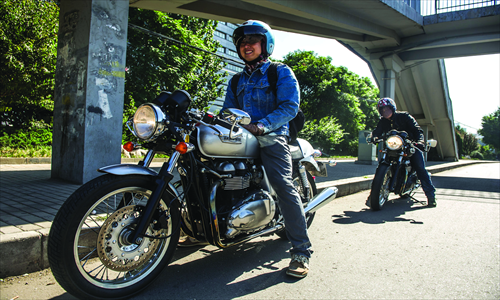
Zhang Kun from the Retro Bikes Club with his Triumph Thruxton 900. Photo: Li Hao/GT
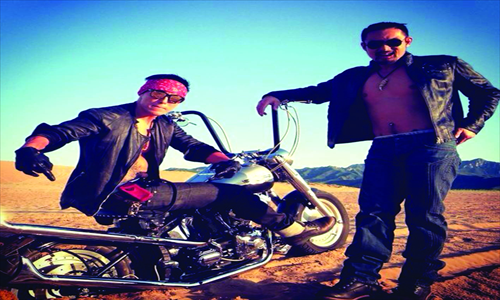
Zhang Guobin (left) and a fellow member of 185 Crew. Photo: Courtesy of Zhang Guobin
Freedom on two wheels
Yin's pride and joy is a Triumph Bonneville T100, which although produced in 2002 features a nostalgic 1960s-era design. Yin prefers motorbikes that look vintage yet have modern fittings.
The Retro Bikes Club is one of the outfits that takes over rural Beijing roads most weekends. The club, which formed in June 2011 and boasts 20 members, plans to head to the Tibet Autonomous Region next year for their annual long-distance ride.
"You don't feel depressed like you do in a car," said Yin, citing motorcyclists' ease in weaving through traffic jams and cruising over dilapidated rural roads.
On Sunday, Zhang Guobin and fellow club members from the 185 Crew rode alongside Luoma Lake in Shunyi district, about 40 kilometers northeast of downtown Beijing. The club doesn't welcome diminutive riders, attributing its name to the fact that most of the 10 members stand over 1.85 meters tall.
But it's not just the riders who stand tall.
Zhang, 33, owns a 2003 Harley-Davidson Fat Boy chopper with modified handlebars towering nearly 1.8 meters off the ground. "I like bikes that give a feeling of power," said Zhang. "Being sturdy and tough, bearing responsibility and strength - that's what I see in my bike."
Unlike their Retro Bikes Club counterparts who favor vintage British motorbikes, members of 185 Crew prefer American "hogs" like those made by Harley-Davidson.
Yin concedes that modern American motorcycles exude a "tougher" appearance, although argues that they can't compare with British brands' superior workmanship.
"Every club has their distinctive features, and everyone has different opinions about motorcycles," said Yin, who has owned Harley-Davidson, Suzuki, Kawasaki and Ducati motorcycles since he was 17.
"I pursued speed when I was younger, but now I'm more interested in motorcycle culture," he said. "I ride slower these days to savor the comfort and feeling of freedom that comes from riding with the wind."
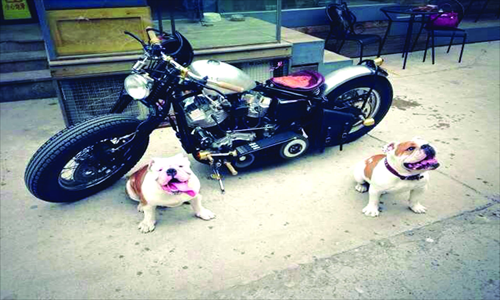
Zhou Zinan's Zero Engineering motorcycle. Photo: Courtesy of Zhou Zinan
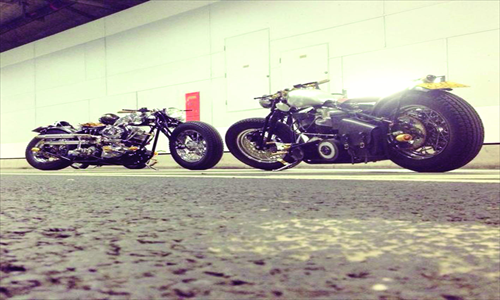
Motorcycles belonging to Zhou and another rider. Photo: Courtesy of Zhou Zinan
Diverse sub-cultures
The topic of conversation between Yin and his fellow riders invariably centers on motorcycles, with club members often sharing their thoughts about manufacturers, parts, riding techniques and more. Yin claims he can even identify a motorcycle's brand and model just from listening to one passing by, explaining that every engine sounds unique.
In addition to riding vintage British motorcycles, Yin and his cohorts have also embraced vintage British fashion. They even carry around leather satchels and wallets to look the part when riding their bikes, many of which sport the Union Jack.
"Unlike the more common color of black, my riding gloves are yellow because many British motorcyclists during the 20th century wore yellow gloves," said Yin. "We wear the same clothes and ride the same bikes [as 20th century Britons]. The only difference is that we live in different times."
Yin noticed a surge in people in Beijing riding vintage motorcycles in 2010, which kick-started his own passion. "A few years ago, people would underestimate the price of vintage motorcycles. Now, more people have a better understanding," he said.
Zhou Zinan, 28, owns a motorcycle manufactured by Zero Engineering, a custom motorcycle maker founded in 1992 in Japan. Zhou, who is part of an as yet unnamed motorcycle club, proudly boasts that his bike lacks shock absorbers, just like many 1970s American motorcycles.
"I don't like modern vehicles," said Zhou, who reads motorcycling magazines in English, French and Japanese. "BMW motorcyclists consider Harley-Davidsons dangerous and uncomfortable because they lack creature comforts like seat warmers. I've ridden some modern motorcycles, and I don't like things to be too comfortable. Motorcycles aren't meant to be comfortable."
Unlike Yin and Zhou who idolize the past, Zhang has been fascinated by modern American culture since childhood. He cites American superhero film Ghost Rider (2007) based on the namesake comic stunt motorcyclist as one of his inspirations for sparking his interest in motorcycles.
Zhang describes Chinese motorcycle culture as "about 10 years behind" Japan. But he is confident China's two-wheeled love affair is growing, as proven by the increasing number of dealerships in major cities.
Cruising on smuggled rides
Even though there are many dealerships to legitimately buy motorcycles in China, hefty price tags inflated by import taxes turn many riders to illegal channels.
Many foreign motorcycles are smuggled into the country, either assembled whole or through parts, which are then sold at discounted prices. The Jiefang Daily reported in August that Shanghai customs authorities had busted a smuggling ring specializing in imported cars and motorcycles. The motorcycles, most of which were unassembled, were shipped into China using forged documents.
Yin bought his smuggled Bonneville T100 for 90,000 yuan ($14,710), a fraction of the retail price of 160,000 yuan in China.
"Motorcycles seem to be popular everywhere in the world except China. Smuggled bikes are a necessity in domestic motorcycling circles," explained Yin, who said import taxes mean the price of new motorcycles is nearly twice as much in China compared to countries where they are manufactured.
Yin is not alone, with Zhang and Zhou also admitting they bought their motorcycles privately instead of from dealerships. Most motorcycles in Beijing, which are banned from being ridden within the Fourth Ring Road, are registered in other provinces if they are registered at all. Fake license plates are abundant on Taobao.com, China's largest online retail website.
Safety at stake
Riding motorcycles in Beijing can also be risky business, according to all three riders interviewed by Metropolitan.
"Almost every time we ride, we see riders who have crashed," said Zhou.
Yin, a former speed skating prodigy, was spared horrific injury due to his athletic reflexes a year ago when he was hit head on by a car. He injured his shoulders and fingers in another accident in 2004.
Yin said family members always tell him that it's safer to get behind the wheel of a car, but their pleas aren't enough to convince him to give up his motorcycle. "Young people like exciting things, don't they?" Yin grinned.
Zhou said his friends often receive complaints from senior residents about the noise their motorcycles cause, but insists their bikes strike a balance by "being cool without showing off."
Live to ride, ride to live
There is no "one type" of Beijing motorcyclist, said Zhou, who claims they come from all walks of life.
But many middle-class motorcyclists have deep pockets, sparing no expense on their "boy toys."
Zhang bought his motorcycle for 130,000 yuan in 2011. Yin has spent about 300,000 yuan on motorbikes, while Zhou has forked out around twice this amount.
However, Yin and other riders seldom use their motorcycles for daily commutes due to skyrocketing fuel costs and inner-city traffic restrictions. "Four wheels rein in one's body, but two wheels rein one's soul," Zhou said.